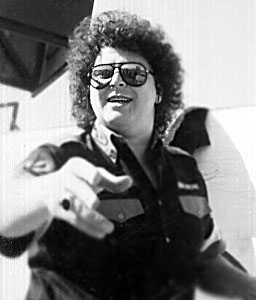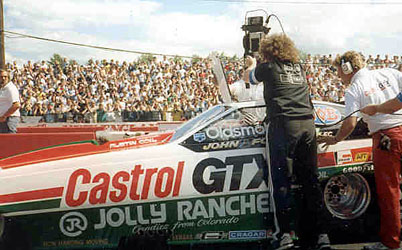| |
For the Record:
|
||||
|
Twenty-some years ago Dean George Papadeas took his video camera to a drag race and wound up changing the look of drag racing video presentation. The "swoopy shot" of running alongside and around fuel cars, shooting from the hip, and in the driver’s face style of camera work that he started using during the 1980s with Main Event Videos have since become standard in motorsports coverage. Never one for keeping his feelings bottled up; never slow to rush in where angels fear to tread; and never known for keeping his mouth shut, the self-proclaimed master of drag racing video has plenty of opinions on the sport, so Drag Racing Online asked him a few questions. Hang on for a wild ride.(We’ve tried to keep it under 5,000 words.) DRO: THE SUBJECT IS DRAG RACING TODAY. WHAT DOES IT NEED? DGP: It needs an ass-kicking, all-nitro TV show. Period. That’s top priority. I always saw fuel racing as pure entertainment and the perfect subject for the camera. Drag racing has to be entertaining not only to the live crowds, but the TV audience as well. They want to see what I want to see: loud burn-outs, earth-shaking leaves, up close images, and the cack. Just give me the cack! DRO: WHAT DOES DRAG RACING LACK? DGP: Entertainment. Fuel altereds, fuel bikes, wheelstand cars and Pro Modified would help. You can’t entertain people with sportsman and bracket cars. Fuel is the key for national events. DRO: WHAT DO YOU WANT TO DO ABOUT IT? DGP: The only thing I’m qualified for besides being a Wal-Mart greeter or tollbooth collector is producing drag racing videos. And I see no difference between video and television shows. I do see a difference in how they’re directed. In the end they both have to entertain. So, you combine the thrill of the sport with the telling of the race. And if you do it with style and continuity and capture the raw essence of it, then the viewer locks in, and guess what? The ratings start to climb until every sponsor starts beating on the door to get in. Without TV you can’t grow. Check that, without TV being watched, you can’t grow.
DGP: Well…I was the first at what I do. Hustler? Not that there’s anything wrong with that. I’ve always been self-employed, so I guess if you don’t hustle, you’re dead. My hair? It’s wilder than me, I assure you. Out to make a buck? With six mouths to feed, a mortgage and three kids in college, what do you think? But you can’t let money be your motivation for anything. In 1971 I owned and operated one of the first car stereo stores in the history of the business—before any of them showed they could make money. It was fun putting music boxes in cars. That’s the road I’ve been on since 1969. You gotta have fun at what you do first. And, hopefully, you’ll make money with it. It was fun playing with a video camera before anybody else did. In 1979, I was shooting fuel cars with the first video software camera just invented. I had already bought the first Betamax in 1975. Talk about fun. Being creative with visuals energized me. I knew home video was the future, and this was before VHS was invented. Weren’t you amazed when you recorded your first tape? Pioneering something that’s contributory for the good of all and makes money as well is a unique deal. Only, it took six years to be profitable. In the meantime, countless hours and years, plus a bunch of dough spent were put in to find the style that would translate the sport to television. In all that time I never charged anybody for my services in doing promos or just giving them footage for their own purposes. I quickly learned that if you want to make a small fortune in this business, start with a large fortune. That rang true. But, I was obsessed. When I saw my first fuel car, I knew this was it. I saw it in my head. Translating it to television was the mission. I knew it would happen if I stuck to it. In 1986, I released the first drag racing commercial home video, "Funny Car Experience" to critical acclaim and spawned a host of video critics. Passion motivates, not money. Money is easy to make. Creating something without precedent, from scratch, is not. And making it happen is very rewarding spiritually and (so far) monetarily. But it’s the "doing it" that is primary. If I made videos work, I figured the money would follow. But making money as a motivating factor is unsatisfying for me personally. I’d rather create something and see it work. As for wild-haired, in your face, etc.…Look, I’m swooping around Top Fuel dragsters closer than anyone ever got to them, except maybe the crew guys. My lens is pointing at what fans want to see, like the nose hairs of the driver. How can you not look wild? You’re getting blasted in the face with 5000 horses of nitro.
|
|||||
|
|
|||||
|
Copyright 1999-2001, Drag
Racing Online and Racing Net Source
|
|||||
 DRO:
BE REALISTIC NOW. A LOT OF FOLKS SEE YOU AS THIS WILD-HAIRED, IN YOUR
FACE "NEW YAWKER" OUT TO MAKE A BUCK LIKE EVERYONE ELSE. WHAT
SEPARATES YOU FROM THE OTHER HUSTLERS OUT THERE?
DRO:
BE REALISTIC NOW. A LOT OF FOLKS SEE YOU AS THIS WILD-HAIRED, IN YOUR
FACE "NEW YAWKER" OUT TO MAKE A BUCK LIKE EVERYONE ELSE. WHAT
SEPARATES YOU FROM THE OTHER HUSTLERS OUT THERE?